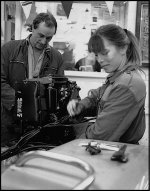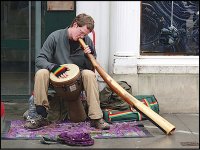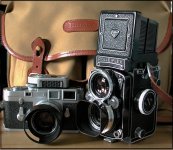- Messages
- 8,339
- Name
- Ian
- Edit My Images
- No
This is something that comes up quite a bit in my classes. When I ask people "why" they too a photo (in a genuine questioning-the-reason way, and not a combative way) I very often get a shrug. This can vary from beginner (which I sort of expect) to advanced (which I find odd).
There are many times when I don't really care about the image. If I'm testing a lens/film/camera and just want an image to prove something works or doesn't. Or when I have a few frames left on a roll and want to develop the film. Or if I'm just messing about with an idea - not sure if it will work or not. But I wouldn't present these images as "my work" mainly because they're not "me".
After watching Adrian's "Curse of the Photographer" video that Chris posted, I wondered if I was ever dissatisfied with an image I'd made. The only images that fall into this category are ones I didn't care too much about taking.
A few years ago, I won the (TP) POTY January comp with a photo of Castlerigg. Technically it was ok and was taken very much with a "following the rules" mentality. A little over-cooked with HDR (IMO), but it was lovely lighting and had the traditional "rock in the foreground". It got the most votes, and I was quite chuffed to win. I won a print of it, and it's still on the wall downstairs. But whenever I walk past it, over the years, I have become more and more dissatisfied with it. It's decor - pure & simple - but it has so little meaning to me, I find it emotionally empty. I have other photos scattered around my office that are far less "decorous" but I enjoy them far more because they have much more meaning.
I guess what I'm saying is, for me, I need to have a connection to an image for it to mean something to me. And if I don't, then I very quickly become detached from it - whether I've taken it or someone else has. I was wondering whether this was a "me" thing, or something others experience, or is it something common to all photographers? (the ones who take pictures for themselves that is, not for comps, or for clients)
[Edit, I'll add some examples in a bit...]
There are many times when I don't really care about the image. If I'm testing a lens/film/camera and just want an image to prove something works or doesn't. Or when I have a few frames left on a roll and want to develop the film. Or if I'm just messing about with an idea - not sure if it will work or not. But I wouldn't present these images as "my work" mainly because they're not "me".
After watching Adrian's "Curse of the Photographer" video that Chris posted, I wondered if I was ever dissatisfied with an image I'd made. The only images that fall into this category are ones I didn't care too much about taking.
A few years ago, I won the (TP) POTY January comp with a photo of Castlerigg. Technically it was ok and was taken very much with a "following the rules" mentality. A little over-cooked with HDR (IMO), but it was lovely lighting and had the traditional "rock in the foreground". It got the most votes, and I was quite chuffed to win. I won a print of it, and it's still on the wall downstairs. But whenever I walk past it, over the years, I have become more and more dissatisfied with it. It's decor - pure & simple - but it has so little meaning to me, I find it emotionally empty. I have other photos scattered around my office that are far less "decorous" but I enjoy them far more because they have much more meaning.
I guess what I'm saying is, for me, I need to have a connection to an image for it to mean something to me. And if I don't, then I very quickly become detached from it - whether I've taken it or someone else has. I was wondering whether this was a "me" thing, or something others experience, or is it something common to all photographers? (the ones who take pictures for themselves that is, not for comps, or for clients)
[Edit, I'll add some examples in a bit...]
Last edited:





 there is even a special prefix - Concepts - for it
there is even a special prefix - Concepts - for it
